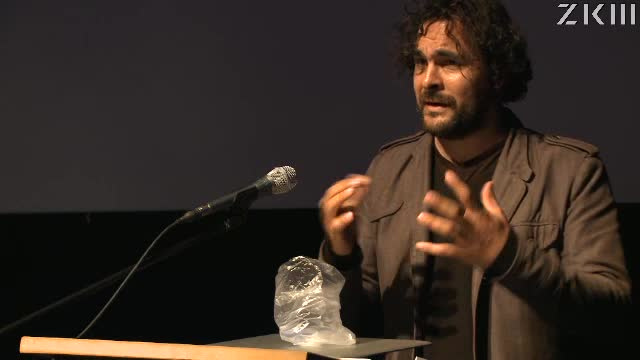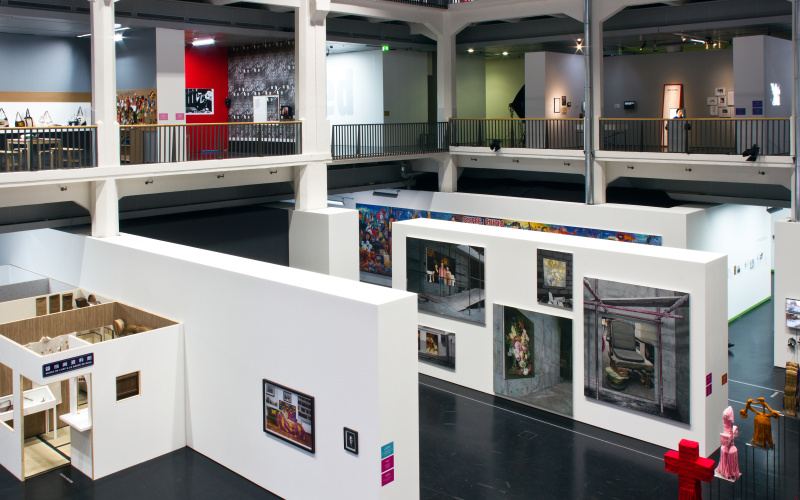The Global Contemporary. Gespräch mit Kader Attia

- Date
- Duration
- 10:58
Description
Untitled (Plastic Bags), 2008–2011
In Kader Attia’s most recent work Untitled (Plastic Bags) the plastic bag itself becomes the stuff of which dreams are made. For decades, this piece of polyethylene was left over at the end of each shopping session. Although the triumphal march of the plastic bag has meanwhile collapsed for ecological reasons, it still retains something of its erstwhile promise of being able to have everything – one simply goes to the shop next door. No less caught up with the image of the colored bag, however, are associations with those smoldering suburban conflicts of migrants; the plastic bag, especially in Germany, is also intimately connected to shopping at a Turkish supermarket, or at street vendors etc.
In Untitled (Plastic Bags) Attia presented nine colored copies of this machine of (dis-) illusion, which he had collected in the Middle East, in Africa, South and North America and Europe. Before plastic became plastic it was filled with primary raw materials or basic foods: bottles of oil, rice, flour, cartons of milk etc. Once removed, the imprint of its former contents remains for a certain amount of time though begins to fade, until finally collapsing over the course of the exhibition. With a pronounced sense of irony, Attia develops his stance towards globalization and it’s all too frequently suppressed downside, to which belong the exploitation of raw materials no less than the presentation of the cultural preeminence of the West as opposed to the “other.” Only as imprint, as empty form, does, for example, rice leave traces of its identity on the global, everyday material of the plastic bag, per se, symbol of capitalist world order. (KB)
///
Untitled (Plastic Bags), 2008–2011
In Kader Attias jüngster Arbeit Untitled (Plastic Bags) wird die Plastiktüte zum Stoff, aus dem die Träume sind. Am Ende jedes Einkaufs stand jahrzehntelang nahezu weltweit dieses Stück Polyethylen. Obwohl ökologische Erwägungen den Siegeszug der Plastiktüte mittlerweile beendet haben, ist und bleibt sie ein Stück des großen Versprechens, alles haben zu können – man muss nur in den Laden nebenan gehen. Im Bild der farbigen Tasche verfangen sich jedoch auch Assoziationen mit schwelenden Migrationskonflikten in den Vorstädten, ist die Plastiktüte doch insbesondere in Deutschland auch eng mit dem Einkauf im türkischen Supermarkt, an Straßenständen etc. verbunden.
Attia präsentiert in Untitled (Plastic Bags) neun farbige Exemplare dieser (Des-)Illusionsmaschine, die er im Nahen Osten, in Afrika, Süd- und Nordamerika und Europa gesammelt hat. Bevor das Plastik zur Plastik wurde, war es mit primären Rohstoffen oder Grundnahrungsmitteln gefüllt: Ölflaschen, Reis, Mehl, Milchtüten etc. Wieder entfernt, bleibt der Abdruck der Inhalte für eine gewisse Zeit erhalten, verliert sich über die Zeit jedoch mehr und mehr, bis die Taschen im Verlauf der Ausstellung in sich zusammenfallen. Auf ironische Art und Weise nimmt Attia mit dieser Aktualisierung der Vergänglichkeitsmetapher Stellung zur Globalisierung und ihren allzu häufig verdrängten Kehrseiten, zu denen Rohstoffausbeutung genauso zählt wie die Vorstellung eines kulturellen Vorsprungs des Westens gegenüber seinem „Anderen“. Nur als Abdruck, als leere Form hinterlässt etwa der Reis Spuren seiner Identität im globalen Alltagsmaterial Plastiktüte, schlechthin Symbol der kapitalistischen Weltordnung. (KB)
